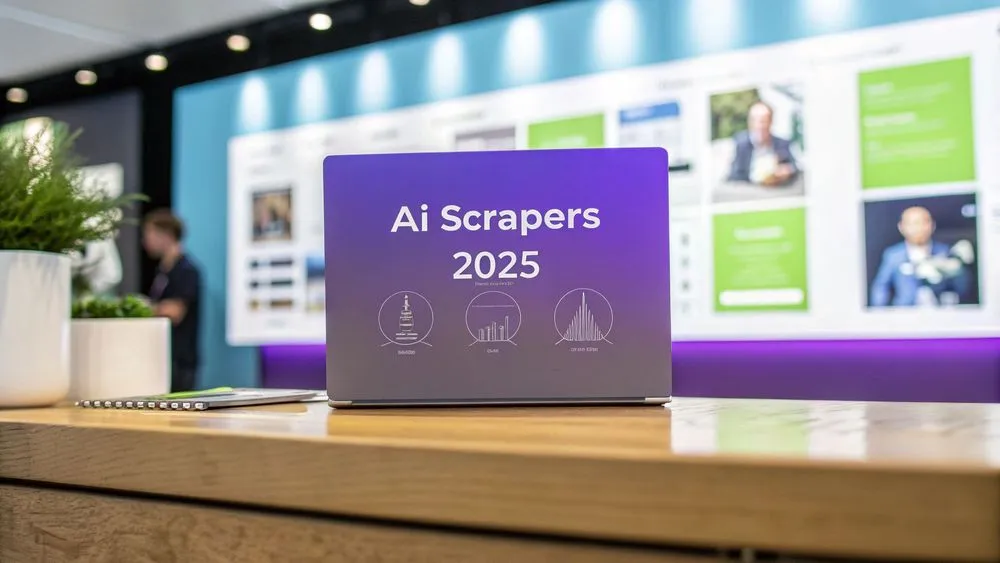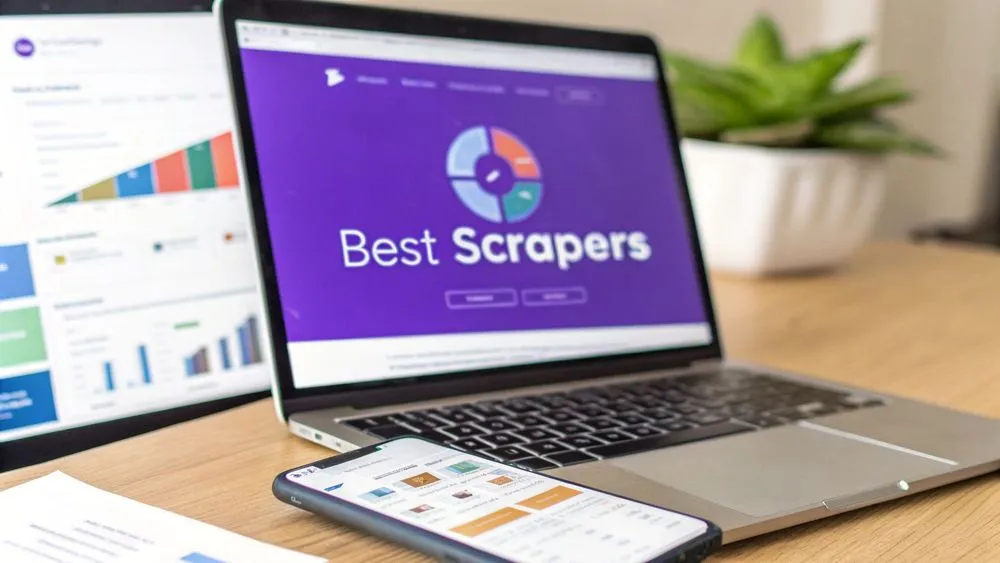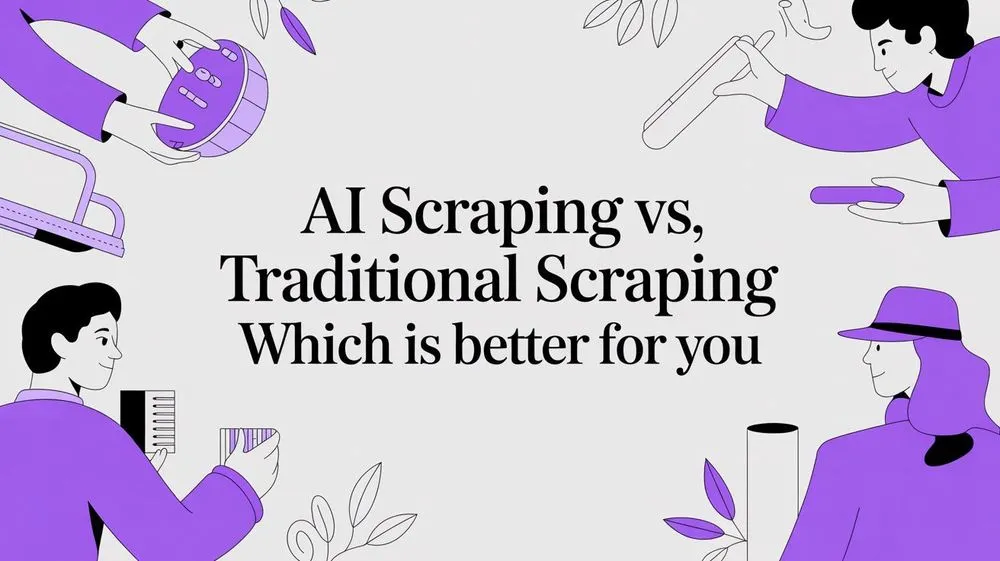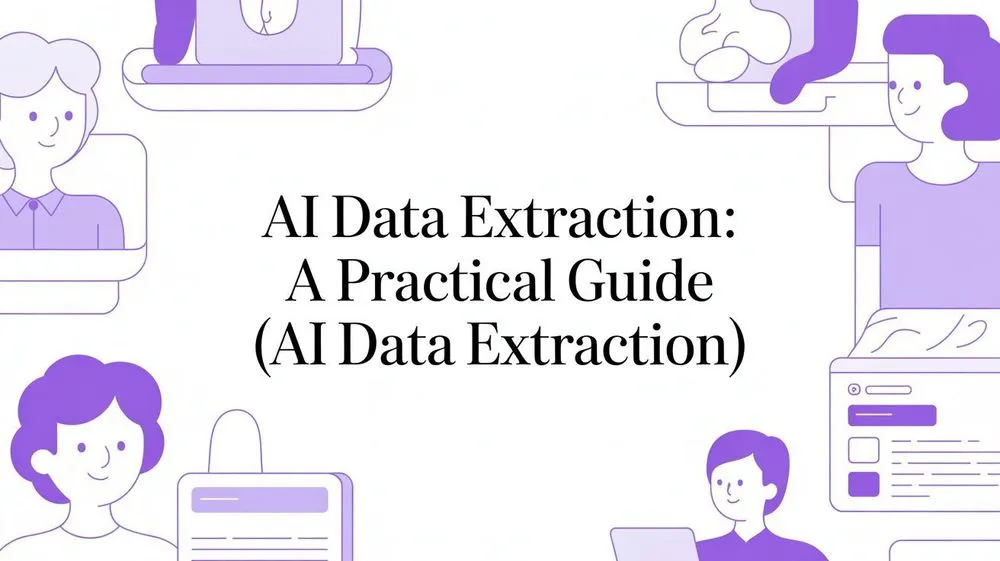In 2025, the demand for fast, accurate data is higher than ever. For recruiters, sales professionals, and marketers, manually collecting profiles from websites like LinkedIn, professional networks, or company directories is a slow and error-prone process that drains valuable time. Traditional scraping tools often require coding knowledge, complex setups, and constant maintenance, putting them out of reach for most business users.
This is where AI-powered scraping tools are revolutionizing the landscape. Instead of wrestling with code, you can now leverage intelligent platforms that automatically understand website structures, bypass common obstacles, and extract clean, organized data with minimal effort. This guide dives deep into the best AI scrapers 2025, focusing on practical, no-code solutions that help you build lead lists, source candidates, and conduct market research faster than ever.
Gathering this kind of data is a core component of competitive intelligence. For a broader perspective on how to outmaneuver rivals, you might also explore the best competitor analysis tools for 2025.
Our comprehensive roundup compares the top platforms, highlighting their unique features, strengths, and limitations to help you find the perfect fit for your specific workflow. Each review includes direct links and practical insights to ensure you can make an informed decision and start collecting valuable data immediately.
1. ProfileSpider
ProfileSpider solidifies its position as one of the best AI scrapers in 2025 by offering a uniquely powerful yet accessible solution for professional profile extraction. It operates as an intelligent Chrome extension that completely removes the technical barriers associated with traditional scraping. Instead of requiring you to build custom scrapers or write code for different websites, its AI-powered engine instantly understands the structure of any webpage, allowing you to extract complete professional profiles with a single click.
This tool is the standout choice for recruiters, sales teams, and marketers who need data fast, without the complexity. Its core strength lies in its "one-click" universal compatibility; it works seamlessly across LinkedIn, Twitter, GitHub, and ANY other website with profile information—no setup required. The extension accurately captures names, job titles, companies, contact info, and social links. Critically, all data is stored locally in your browser, a key feature ensuring complete privacy and GDPR compliance. No data ever leaves your machine without your explicit consent.
Key Strengths and Use Cases
ProfileSpider is purpose-built to contrast the slowness of manual methods and the complexity of coding. The local storage model not only secures your data but also gives you full control. The extension includes robust management features that turn raw data into an organized, actionable database.
- For Recruiters: Build candidate databases from LinkedIn and job boards in minutes. Track potential hires across multiple platforms and export data directly to your ATS.
- For Sales Teams: Identify prospects on social media and collect contact information for lead qualification. A single click saves hours of manual research.
- For Marketers: Quickly build influencer and content creator databases for outreach campaigns. Organize contacts into custom lists for efficient management.
Pricing and Access
ProfileSpider uses a flexible, credit-based system. It offers a free tier to get started, with monthly subscriptions for regular users and non-expiring credit packs for project-based needs. This model ensures you only pay for the profiles you extract. The extension requires Chrome or a Chromium-based browser (version 114+).
- Pros:
- One-click, no-code scraping works instantly on any site.
- AI-powered extraction ensures accurate profile data.
- 100% local data storage for complete privacy and GDPR compliance.
- Smart organization with custom lists, tags, and search.
- Flexible pricing with a free tier.
- Cons:
- Exclusive to Chrome and Chromium-based browsers.
- Credit-based model may require active management for heavy users.
Website: https://profilespider.com
2. Bright Data
Bright Data positions itself as an enterprise-grade, comprehensive data collection infrastructure. While many tools focus solely on the scraping technology, Bright Data bundles its powerful AI-assisted scrapers with a massive proxy network, ensuring high success rates and robust unblocking capabilities. This makes it an excellent choice for teams that need reliable, scalable data extraction without managing the underlying infrastructure themselves. It’s particularly suited for projects requiring structured data from complex sources like e-commerce sites or social media platforms.
Unlike simpler, single-purpose scrapers, Bright Data offers a suite of tools catering to different technical skill levels. Its Web Scraper IDE allows for custom scraper development, while the Scraping Browser provides a browser-like environment for complex interactions. For teams without development resources, their catalog of pre-built scrapers for verticals like e-commerce and social media offers a ready-to-use solution. This versatility makes it one of the best AI scrapers for organizations with diverse data needs.
Key Features and Pricing
Bright Data’s Web Scraper API stands out with its success-based pricing model, charging per 1,000 successfully delivered records. This aligns costs directly with results, which is a major benefit for budget-conscious projects. Pricing is tiered, starting around $5.00 per 1k records for basic scraping and increasing for more complex tasks involving JavaScript rendering or residential proxies. They also offer a fully managed service where their team builds and maintains custom scrapers for a one-time or recurring fee.
- Pros: Transparent pay-per-result pricing, extensive proxy network included, strong enterprise-level support with SLAs.
- Cons: Can become expensive for very large-scale scraping projects, and the extensive product lineup may feel complex for new users.
Website: https://brightdata.com
3. Zyte
Zyte, the company behind the widely-used open-source framework Scrapy, offers a powerful suite of professional tools for large-scale web scraping. It is engineered for developers and data teams who need a robust, scalable infrastructure for complex data extraction projects. Zyte’s core offering, the Zyte API, handles the most difficult aspects of scraping, such as managing proxies, bypassing blocks, and rendering JavaScript-heavy pages, allowing teams to focus on data parsing logic rather than access issues.
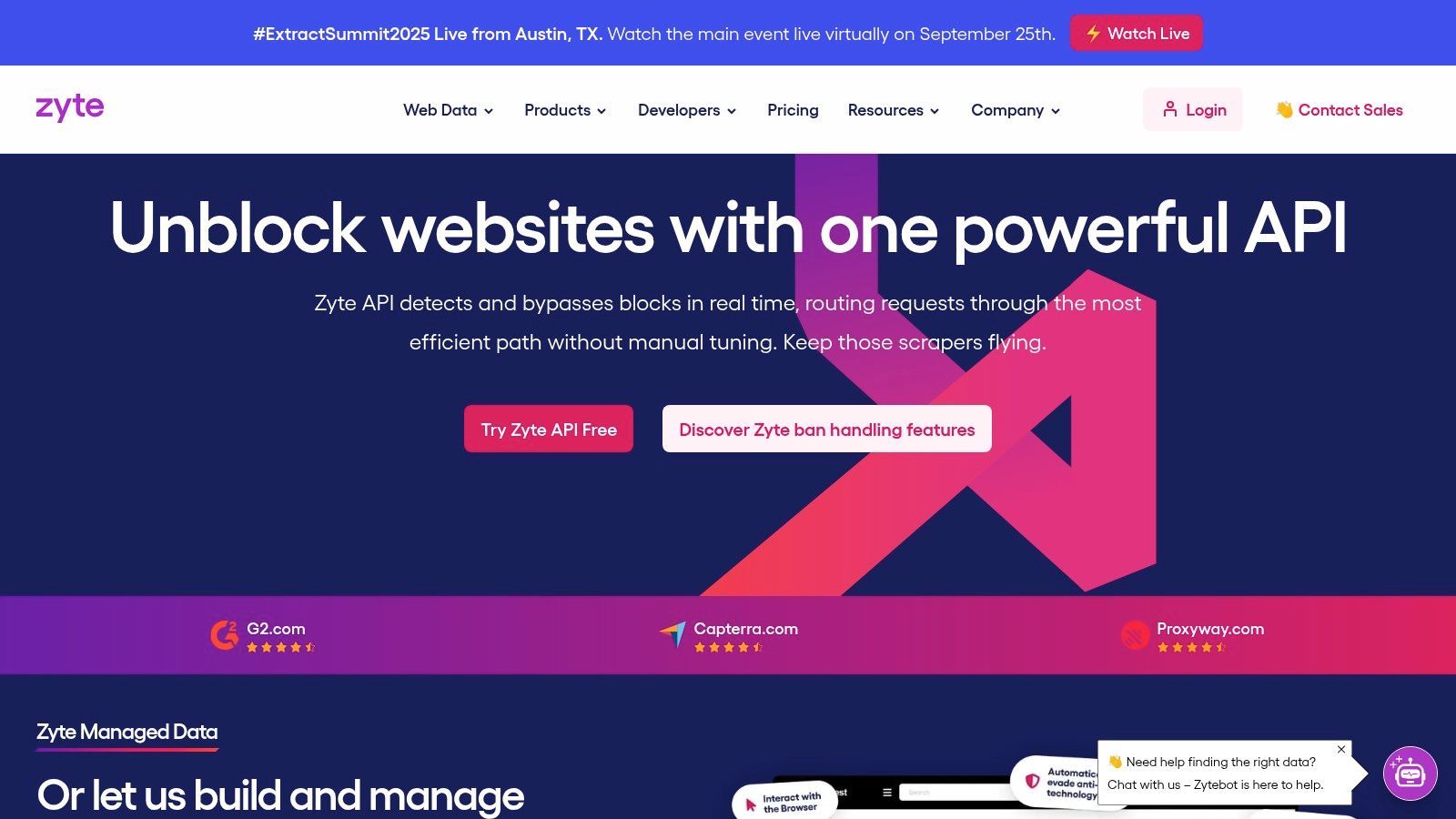
The platform is deeply integrated with the Scrapy ecosystem. Developers can build their scrapers using the familiar Scrapy framework and then deploy and manage them at scale using Scrapy Cloud, Zyte's managed hosting service. This combination provides a seamless workflow from local development to production-level crawling. For those needing a more direct solution, the Zyte API itself can extract structured data automatically, making it one of the best AI scrapers for technical teams needing reliability and scale in 2025.
Key Features and Pricing
Zyte's pricing model is built around successful requests, with costs varying based on the complexity of the target website and the features required. The Zyte API has different tiers, charging per 1,000 successful requests for basic HTML, JavaScript-rendered pages, or fully AI-extracted data. This granular pricing lets users optimize costs based on their exact needs. Scrapy Cloud offers both pay-as-you-go and subscription plans based on compute usage.
- Pros: Tightly integrated with the powerful Scrapy framework, fine-grained pricing based on request complexity, excellent for scaling developer-built scrapers.
- Cons: Pricing tiers can be complex for new users to navigate, and costs can escalate on heavily protected sites that require advanced rendering.
Website: https://www.zyte.com
4. Apify
Apify operates as a flexible cloud platform for web scraping and automation, centered around its ecosystem of "Actors." These are serverless cloud programs that can perform any scraping or automation task. This unique, app-store-like model allows users to either run hundreds of ready-made scraping bots or build and deploy their own, offering a powerful blend of convenience and customizability. It's an excellent choice for teams who need both quick, off-the-shelf solutions and the capability to develop highly specific, custom scraping workflows.
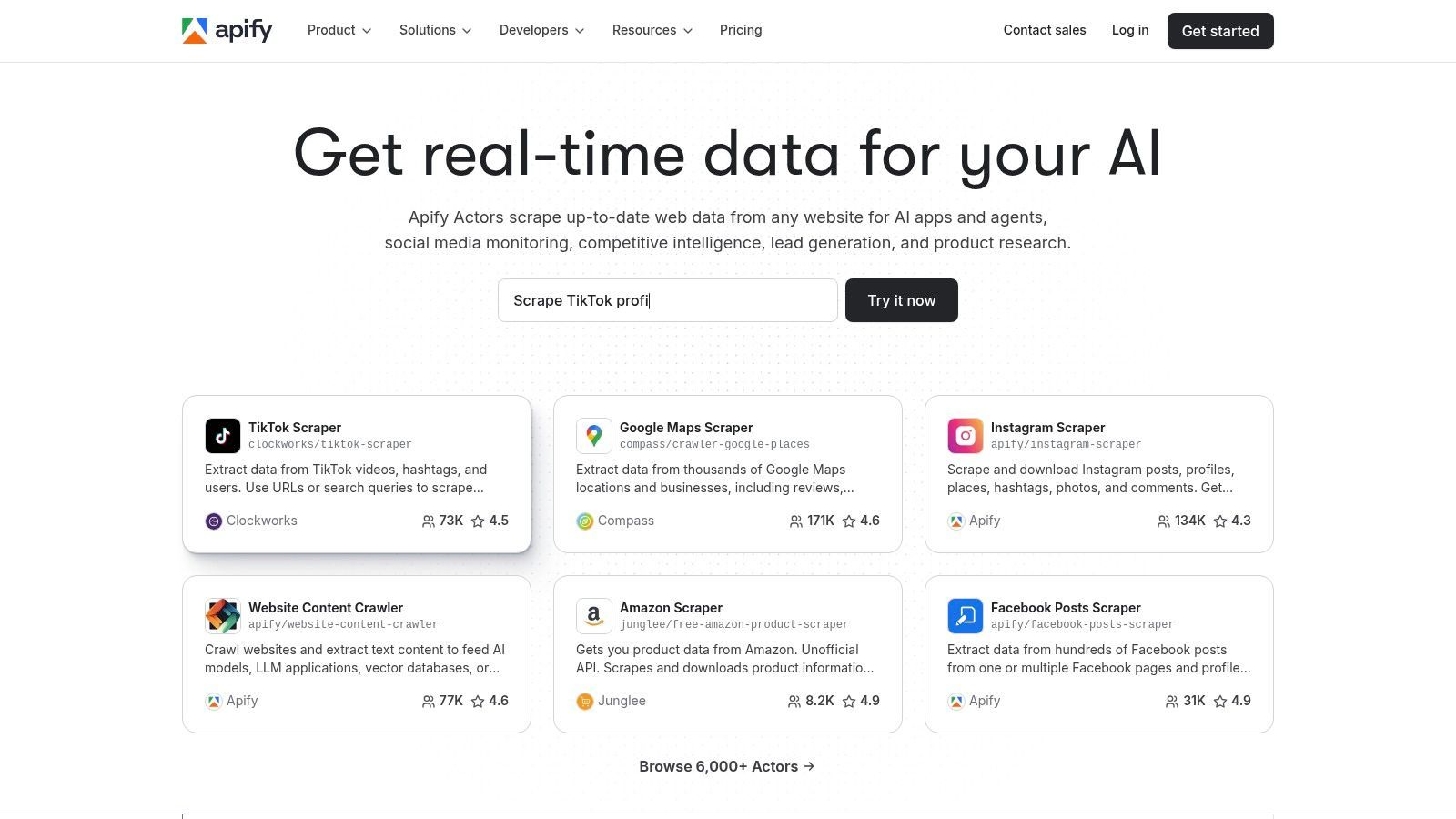
Unlike single-purpose tools, the Apify Store is the platform's core strength, featuring a vast library of maintained Actors for scraping social media, e-commerce sites, Google Maps, and more. For those with development skills, Apify provides an SDK and a robust environment for building custom bots. This dual approach makes it one of the best AI scrapers for users ranging from individual marketers and researchers to large enterprises needing scalable, automated data pipelines.
Key Features and Pricing
Apify’s pricing is based on a credit system, where platform credits are consumed based on compute usage, proxy traffic, and data storage. They offer a generous free tier that includes platform credits, making it highly accessible for small projects or testing. Paid plans scale up, providing more credits, longer data retention, and access to premium support. For large-scale needs, they offer enterprise plans with service-level agreements (SLAs) and dedicated support from their solutions architects.
- Pros: Extensive library of pre-built scrapers (Actors), generous free tier for getting started, scales effectively from small projects to enterprise-level operations.
- Cons: Pay-as-you-go costs can become unpredictable with concurrent or intensive tasks, and achieving optimal results may require some technical configuration or custom development.
Website: https://apify.com
5. Oxylabs
Oxylabs is an enterprise-level web data provider specializing in large-scale data acquisition through a suite of advanced scraping APIs and a vast proxy network. Its offerings are engineered for businesses that demand high reliability, precision, and scalability. The platform integrates AI-powered features for adaptive parsing, CAPTCHA solving, and JavaScript rendering, making it one of the best AI scrapers for tackling dynamic and heavily protected websites with minimal manual intervention. It's a go-to choice for market research, competitive intelligence, and other data-heavy business functions.
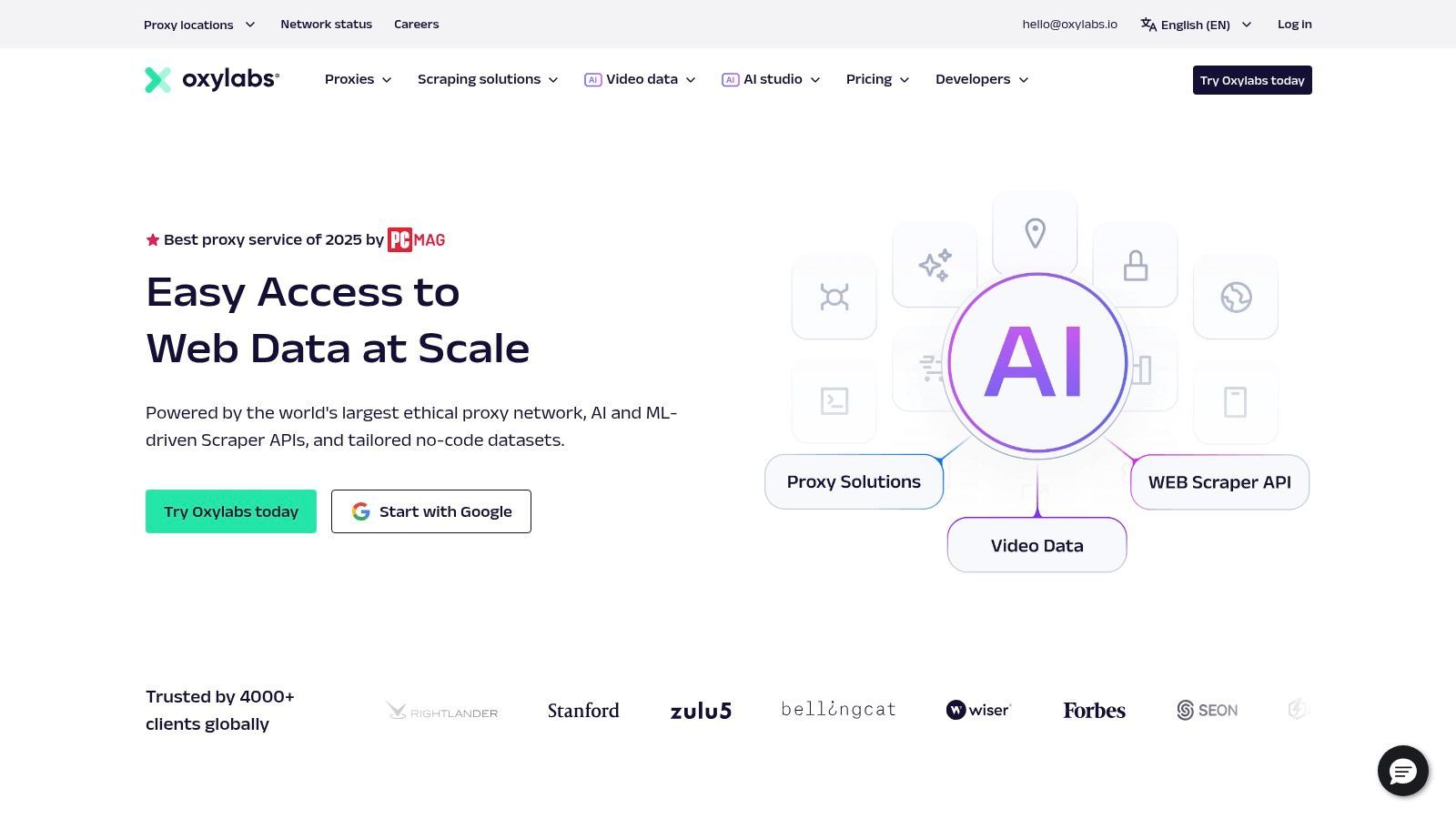
Unlike tools built for smaller projects, Oxylabs focuses on providing a robust infrastructure that handles the complexities of web scraping behind the scenes. Its Web Scraper API and E-Commerce Scraper API allow users to request structured data via a simple API call, abstracting away the need to manage proxies, user agents, or anti-bot countermeasures. This makes it an effective solution for teams that want to focus on data analysis rather than the mechanics of data collection, ensuring a steady stream of high-quality information from virtually any public source.
Key Features and Pricing
Oxylabs' pricing model is highly flexible, with plans often based on successful results rather than just requests. Their Web Scraper API starts with a free trial and then moves to tiered plans, with costs calculated per 1,000 successful results. The pricing structure is designed to scale, offering lower per-unit costs as volume increases, which appeals to growing businesses and large enterprises. Features like geo-targeting, extensive IP coverage, and integrated JavaScript rendering are bundled into these plans, providing a comprehensive solution.
- Pros: Reliable 24/7 support and detailed documentation, flexible plans with success-only billing, strong global IP footprint.
- Cons: The interface and multiple plans can be confusing initially, and enterprise pricing can be expensive compared to smaller providers.
Website: https://oxylabs.io
6. Decodo (formerly Smartproxy)
Decodo, which rebranded from Smartproxy in 2025, offers a streamlined approach to data collection, focusing on a powerful web scraping API bundled with an extensive proxy network. It targets users who need reliable data extraction without the overhead of managing complex infrastructure. The platform is particularly effective for marketing, e-commerce, and business intelligence tasks, providing over 100 pre-built scraper templates that significantly reduce development time and allow teams to access structured data quickly.
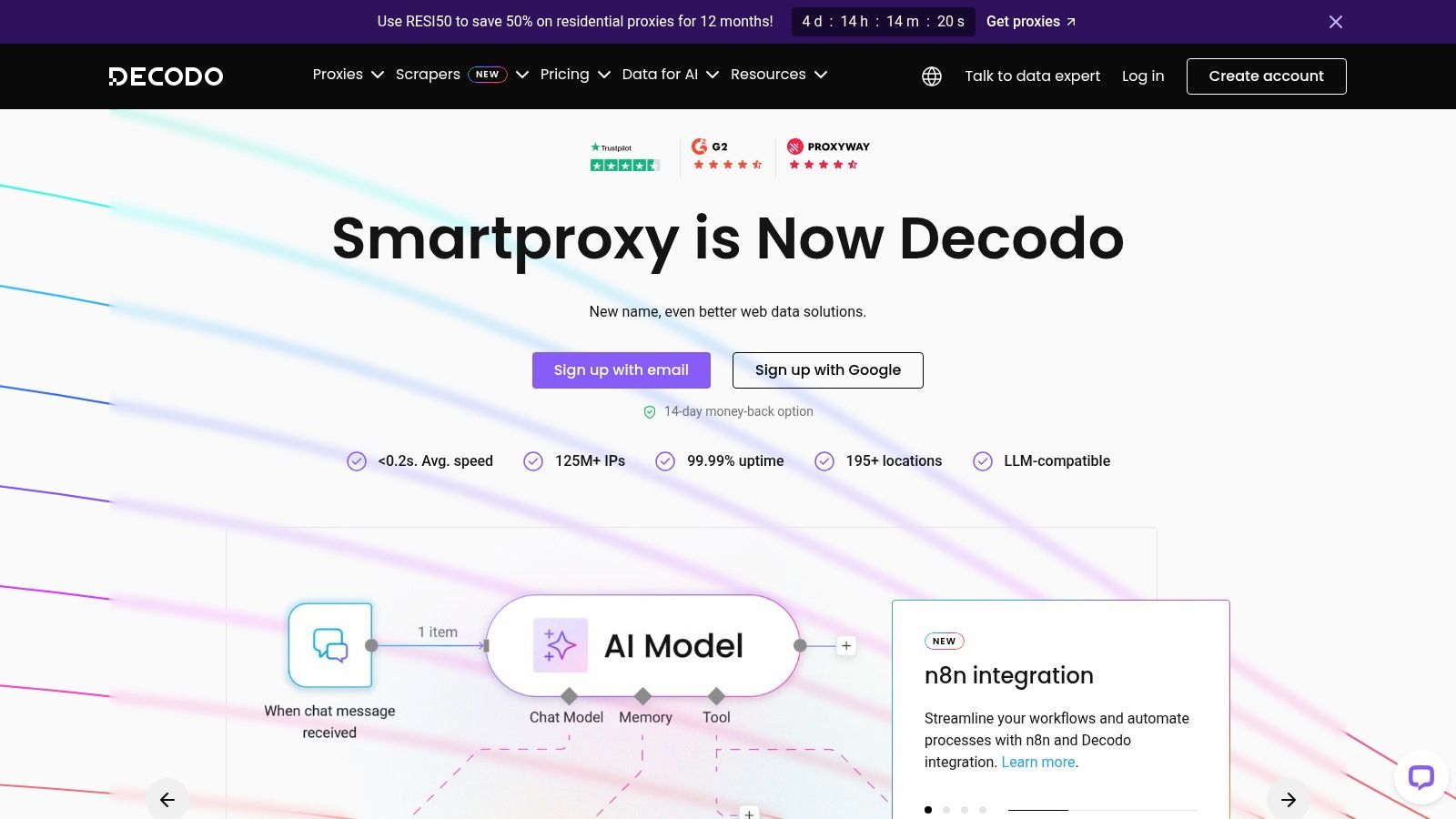
Unlike all-in-one enterprise suites, Decodo emphasizes simplicity and speed. Its core offering is a Web Scraping API that integrates AI parsing to automatically structure data from any target site, turning raw HTML into clean JSON. This makes it one of the best AI scrapers for teams who want to avoid the manual effort of writing and maintaining parsers. The combination of a large global IP pool, including residential and mobile proxies, ensures high success rates for scraping even the most challenging websites.
Key Features and Pricing
Decodo’s pricing is primarily based on the volume of successful requests, making it a cost-effective choice for mid-to-high volume projects. Plans come bundled with a set number of requests, and the AI parsing feature is included, which adds significant value. While they offer trials and money-back options on certain plans, the pricing matrix can be complex, with different tiers for requests, GBs of traffic, and IP types. A clear onboarding process and detailed documentation help new users navigate these options effectively.
- Pros: Competitive pricing for mid-to-high volume scraping, robust pre-built scraper templates, and a strong onboarding process with good support documentation.
- Cons: The pricing structure can be complex to navigate, and the best discounts are reserved for higher commitment and volume plans.
Website: https://decodo.com
7. ScraperAPI
ScraperAPI is a developer-focused tool designed to simplify the web scraping process by handling common obstacles like proxies, browsers, and CAPTCHAs. It functions as a straightforward API endpoint that you call with the target URL, and it returns the raw HTML of the page. This approach is perfect for teams that want to build custom data extraction logic without managing the complex infrastructure of proxy rotation and unblocking technologies. It stands out by offering a simple, unified API to tackle complex scraping challenges with minimal setup.
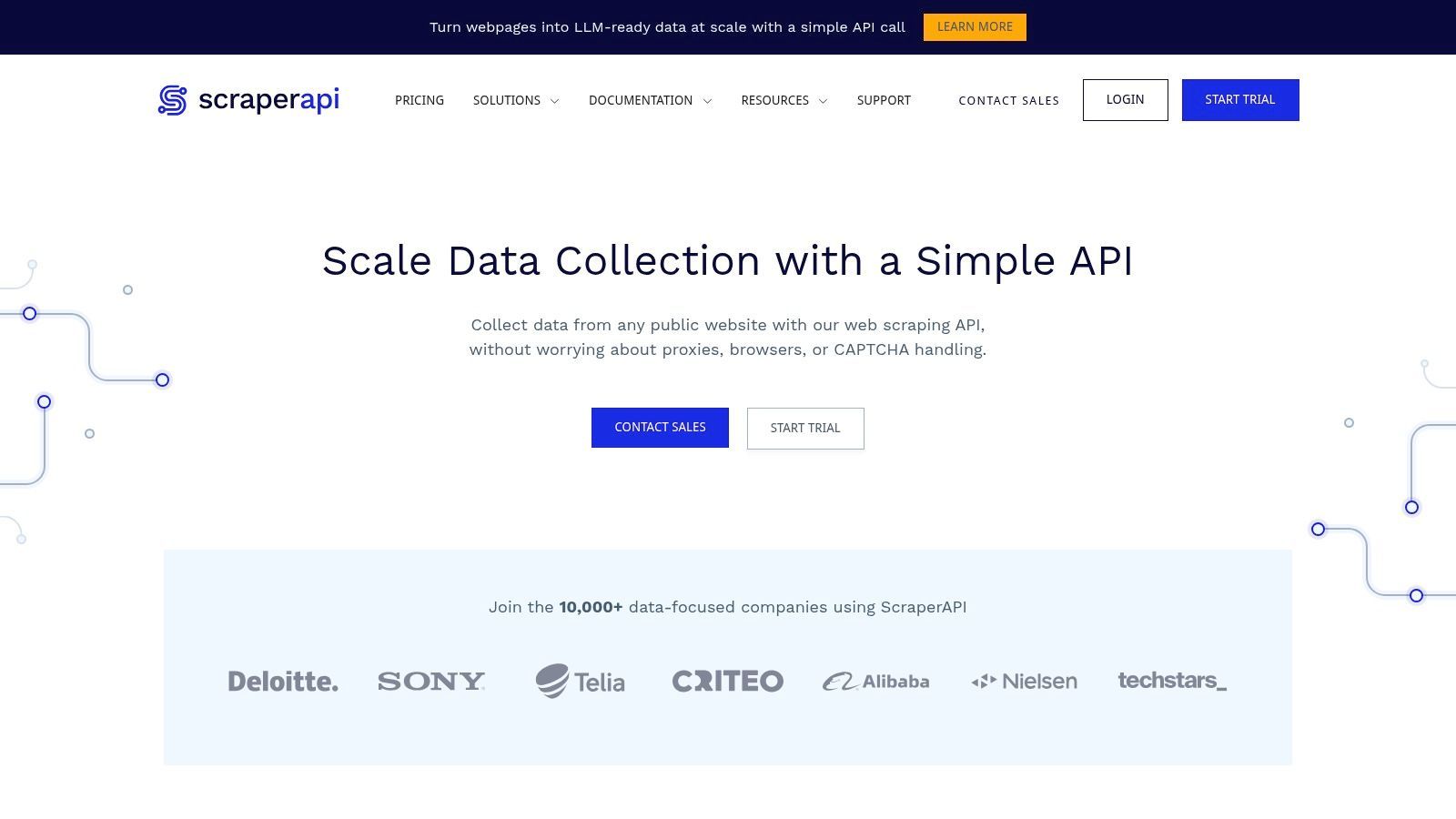
Unlike fully managed platforms, ScraperAPI gives developers full control over parsing while offloading the most tedious parts of scraping. By simply adding parameters to the API call, users can enable JavaScript rendering or access premium residential proxies for tougher websites. This makes it one of the best AI scrapers for projects that require flexibility and rapid integration into existing codebases. For sales and marketing teams, this tool can power automated systems for contact discovery, reinforcing modern strategies for effective lead generation.
Key Features and Pricing
ScraperAPI's pricing is based on a credit system, where different plans provide a monthly allocation of API credits and a cap on concurrent threads. A standard request costs one credit, while activating features like JavaScript rendering or using residential proxies consumes more credits per call. This model is transparent and allows users to predict costs effectively. Plans start with a free trial of 5,000 credits, with paid tiers designed to scale from small projects to large enterprise needs. The billing is success-only, meaning you aren't charged for failed requests.
- Pros: Extremely fast integration with a generous free trial, transparent and well-documented credit costs, great value for small to medium-sized workloads.
- Cons: Access to diverse regional IPs is limited on lower-tier plans (mostly US/EU), and scraping heavily protected sites can consume credits quickly.
Website: https://www.scraperapi.com
8. Octoparse
Octoparse democratizes web scraping by offering a powerful yet accessible no-code platform for both desktop and cloud-based data extraction. It is designed for users without a development background, such as marketers, researchers, and sales teams, allowing them to build scrapers through a simple point-and-click interface. This approach drastically lowers the barrier to entry for automated data collection, making it a strong contender among the best AI scrapers of 2025 for teams that prioritize speed and ease of use over complex custom coding.
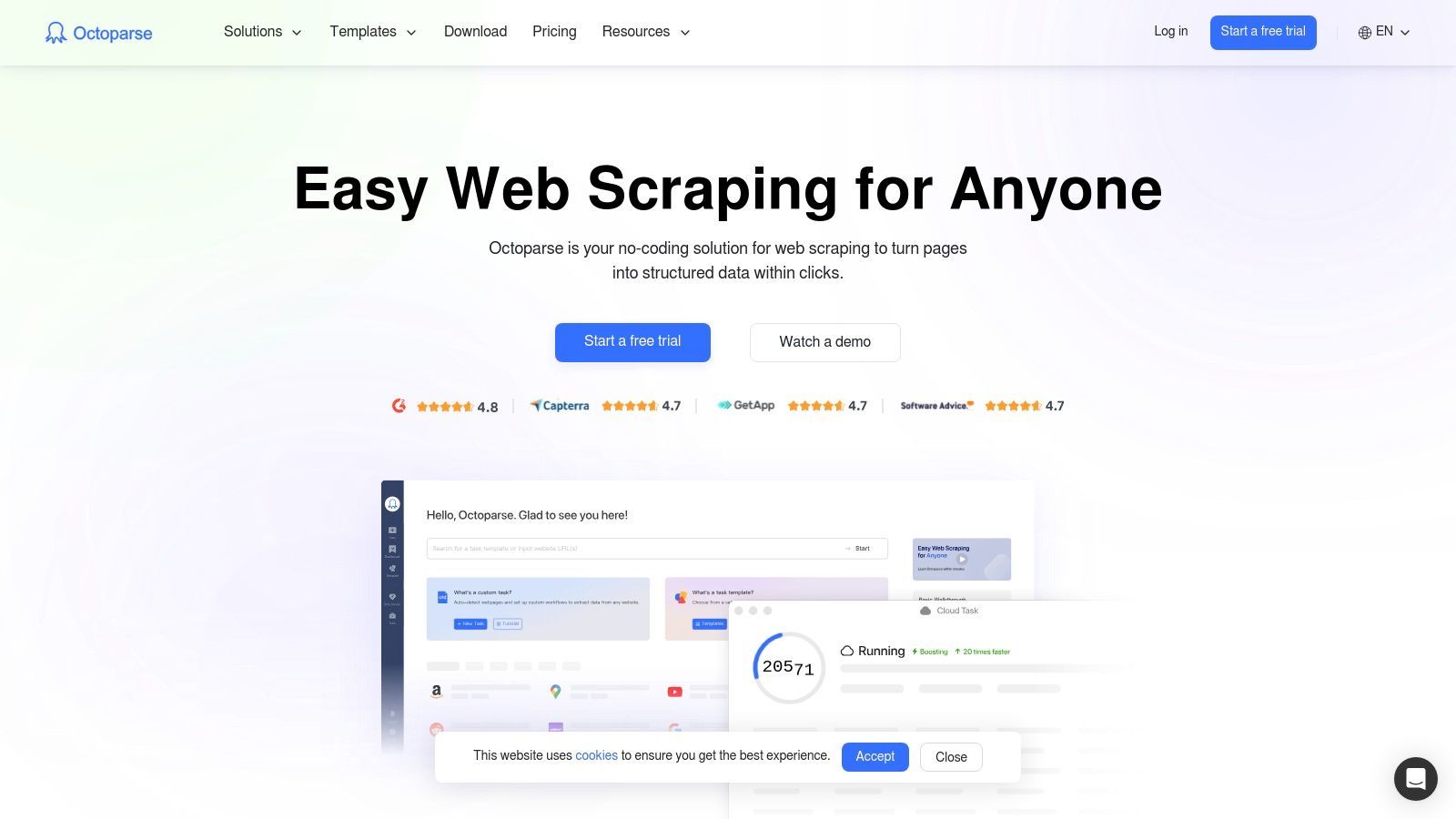
Unlike purely developer-focused tools, Octoparse bridges the gap between simplicity and power. Its visual workflow designer lets users mimic human browsing behavior to navigate pages, log in, and extract data from complex sites. For more challenging targets, the platform offers add-ons like residential proxies and AI-powered CAPTCHA solving, which can be integrated into scraping tasks. For businesses that prefer a hands-off approach, Octoparse also provides managed data and crawler services, where their experts build and maintain the scrapers for you.
Key Features and Pricing
Octoparse operates on a subscription model with a generous free tier that allows for up to 10 scraping tasks. Paid plans start from around $89 per month (or $75/month when billed annually) and scale up based on the number of concurrent cloud runs, scraping speed, and access to advanced features like API integration and scheduled tasks. The platform also offers pay-per-result templates for notoriously difficult sites, ensuring you only pay for successfully extracted data.
- Pros: Highly accessible for non-developers, fast for building proof-of-concept scrapers, offers discounts for startups and universities.
- Cons: The desktop tool can require ongoing maintenance for sites with frequent layout changes, and heavy anti-bot sites may necessitate purchasing proxy or CAPTCHA add-ons.
Website: https://www.octoparse.com
9. Diffbot
Diffbot stands out by fundamentally changing the approach to web scraping. Instead of relying on manual CSS selectors that break with website updates, Diffbot uses AI and computer vision to automatically identify and extract structured data from any webpage, such as articles, products, or discussion forums. This makes it an incredibly resilient solution for long-term data projects, as it removes the constant maintenance burden associated with traditional scrapers. It's best suited for businesses that need to turn the unstructured web into a structured database without managing complex extraction rules.
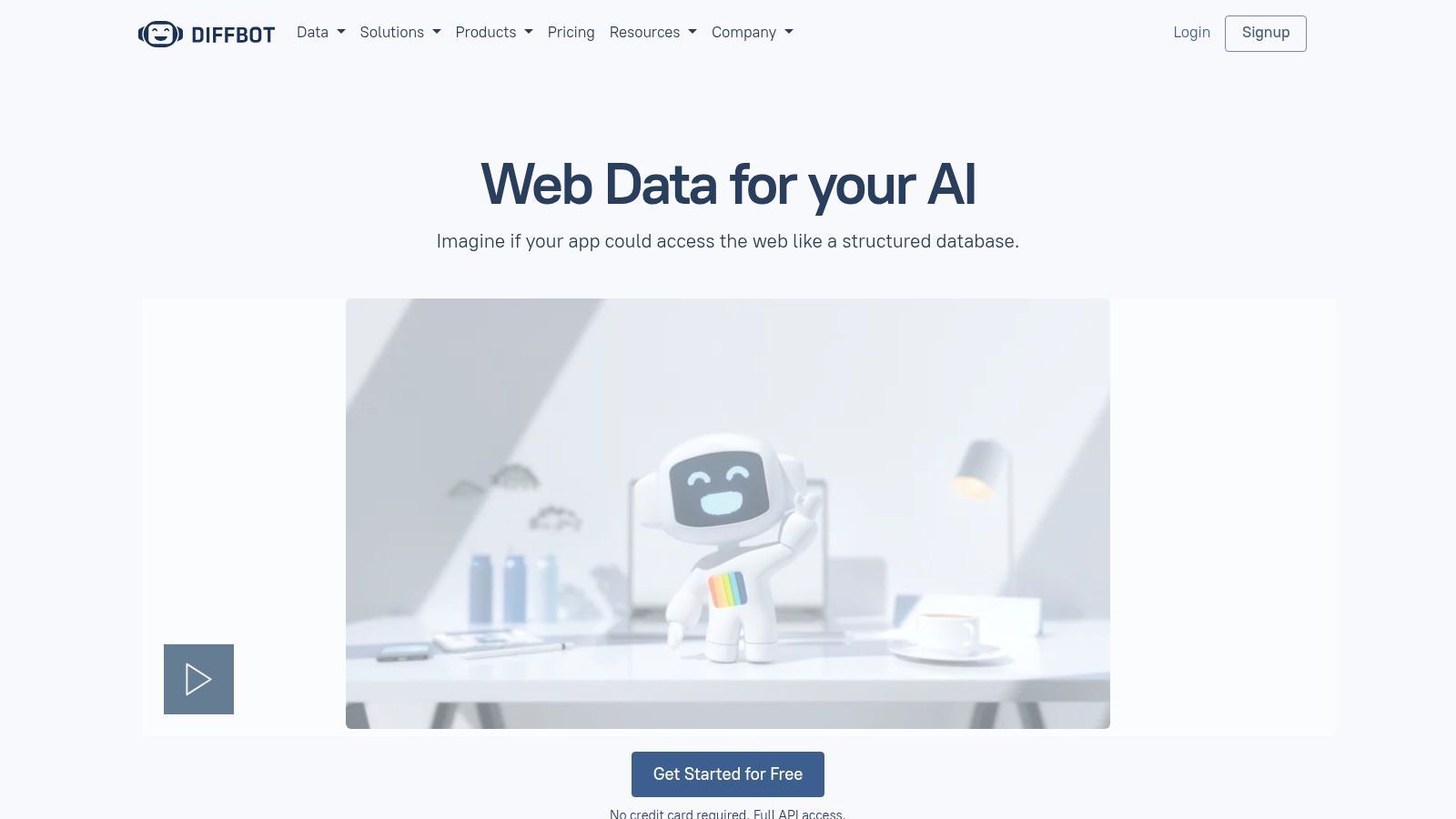
What makes Diffbot one of the best AI scrapers for 2025 is its massive, pre-built Knowledge Graph. Users can query this graph to enrich their extracted data or find entity-level information directly, bypassing the need to scrape certain sites altogether. Its Automatic Extraction APIs can transform any URL into clean, machine-readable JSON, while the Crawlbot feature allows for site-wide data collection. This combination of automatic extraction and data enrichment is ideal for market intelligence, news monitoring, and building comprehensive datasets.
Key Features and Pricing
Diffbot operates on a credit-based pricing model where users purchase API call packages. Plans start with a free trial of 10,000 credits, allowing for thorough testing. Paid plans are tiered, with the "Startup" plan offering 250,000 credits for a monthly fee. The cost-per-call decreases as you move to higher-tier plans. This model gives users flexibility but requires careful monitoring to manage expenses, especially for large-scale crawling operations where credit usage can accumulate quickly.
- Pros: Eliminates the need for manual scraper maintenance, powerful data enrichment with its Knowledge Graph, free tier available for development.
- Cons: Credit-based pricing can be unpredictable for large projects, and it's less ideal for users who prefer the granular control of manual CSS selectors.
Website: https://www.diffbot.com
10. Webz.io
Webz.io takes a different approach by operating as a Data-as-a-Service (DaaS) provider rather than a direct scraping tool. It specializes in delivering structured, ready-to-consume data feeds from a massive repository of news, blogs, forums, and e-commerce reviews. For teams that need historical web data without the overhead of building and maintaining their own crawlers, Webz.io offers an invaluable resource, with archives stretching back over a decade. This makes it ideal for market research, brand monitoring, and sentiment analysis projects that require broad, longitudinal data sets.
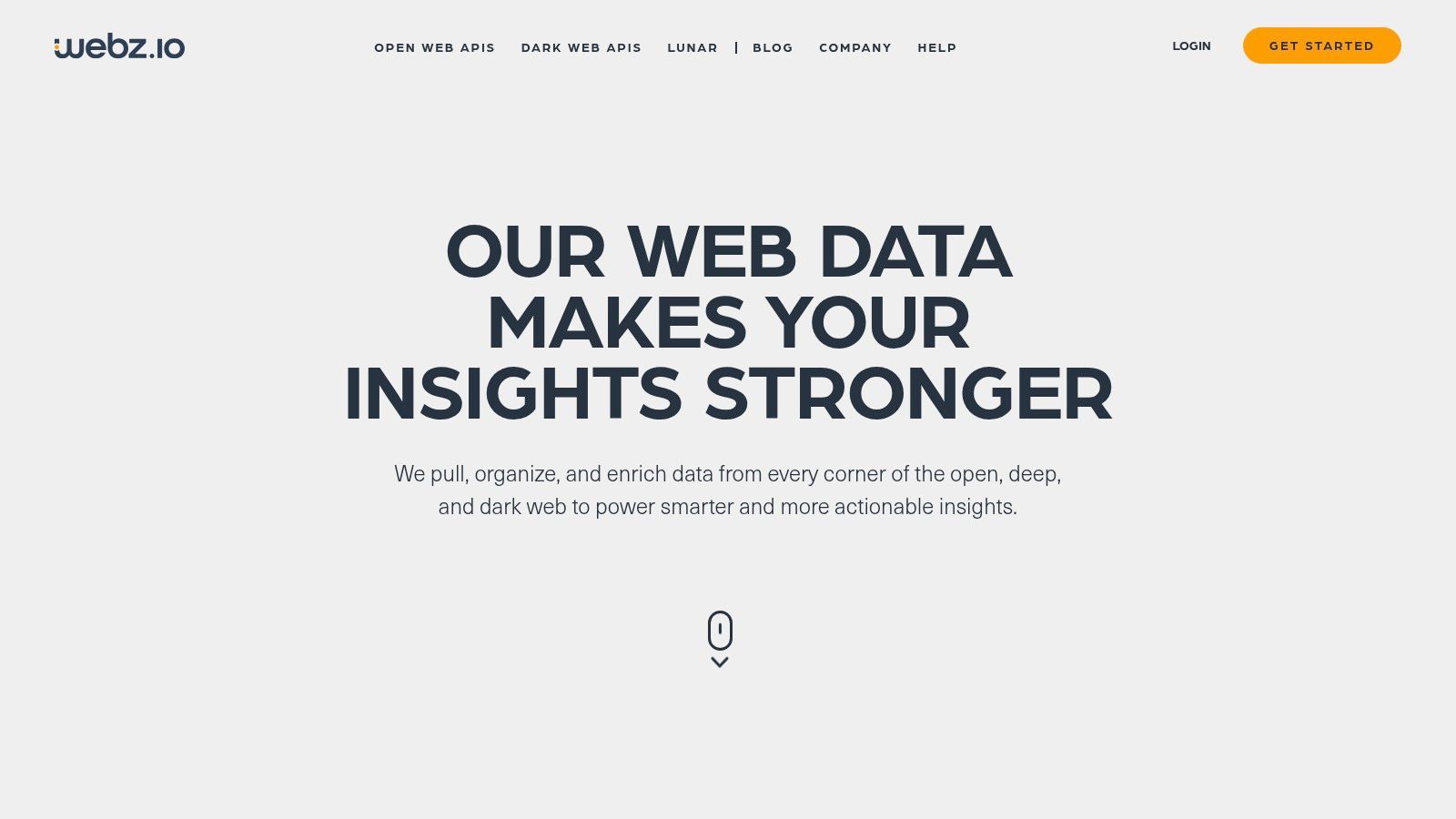
Instead of users building scrapers, they access cleaned and enriched data directly via API or a data firehose. This model significantly lowers the technical barrier, allowing marketers, researchers, and business analysts to tap into vast web data without writing a single line of code. Its ability to provide multilingual data across various verticals makes it a powerful component in the toolkit of anyone needing one of the best AI scrapers for comprehensive, historical web intelligence rather than real-time profile extraction.
Key Features and Pricing
Webz.io's pricing is primarily consumption-based, often following a "pay per post" model that scales with usage. They offer a free tier, the News API Lite, which allows users to test the service with a limited number of requests. For larger-scale needs, pricing is typically provided through a custom sales quote, tailored to the specific data feeds, volume, and historical depth required. This approach is common for enterprise-grade data providers but can be less transparent for smaller teams.
- Pros: Provides turnkey access to cleaned and enriched historical data, broad coverage of news, blogs, and forums, and strong consulting support.
- Cons: Pricing is less transparent and mostly available via sales quotes, and it offers less control and specificity compared to building custom crawlers.
Website: https://webz.io
11. SerpApi
SerpApi carves out a specific and crucial niche in the data extraction landscape by focusing exclusively on scraping search engine results pages (SERPs). Instead of a general-purpose web scraper, it provides a highly reliable, real-time API to access structured data from Google, Bing, Baidu, and other search engines. This specialization makes it an indispensable tool for SEO professionals, marketers, and developers building AI applications (like RAG systems) that require clean, consistent search data without the hassle of managing proxies or parsing complex HTML.
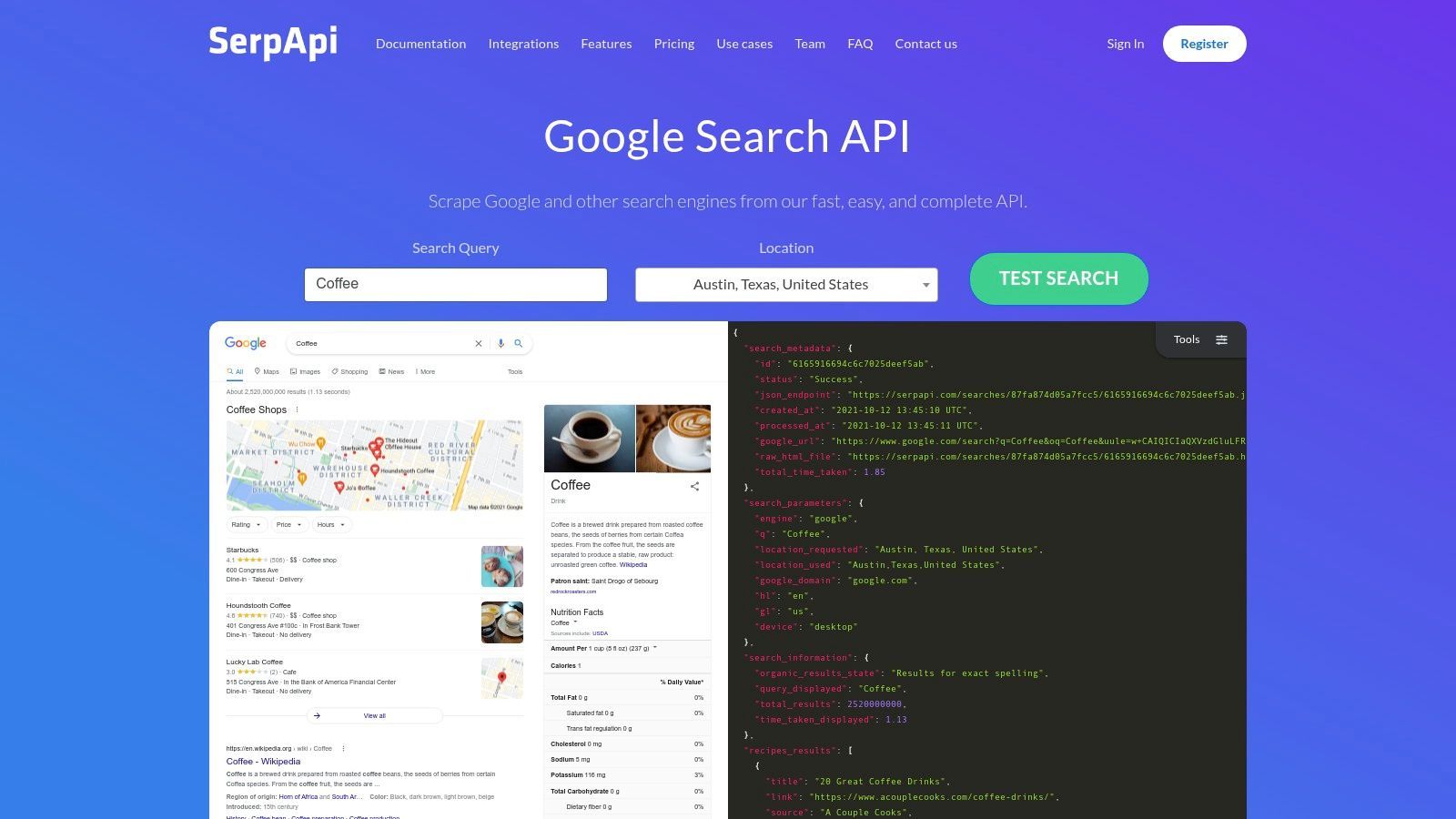
The platform handles all the complexities of search engine scraping, including CAPTCHA solving, proxy management, and browser emulation. Users simply make an API call with their query and desired parameters (like location or language), and SerpApi returns a clean, structured JSON response. This focus on developer experience and reliability is a key differentiator. Enterprise users also benefit from a U.S. Legal Shield, providing a layer of protection for their data collection activities, positioning it as one of the best AI scrapers for compliant, large-scale SERP analysis.
Key Features and Pricing
SerpApi's pricing is transparent and based on the number of successful searches per month. The "Developer" plan starts at $50/month for 5,000 searches, scaling up to a "Production" plan at $130/month for 15,000 searches. Larger-scale needs are met with custom enterprise plans that include higher throughput, dedicated support, and Service Level Agreements (SLAs). All paid plans provide full access to all supported search engines, ensuring users get comprehensive data regardless of their subscription tier.
- Pros: Highly reliable and mature SERP parsing with stable data schemas, excellent developer documentation and a clear, success-based pricing model, enterprise-grade legal and support options.
- Cons: Strictly focused on SERP data, not suitable for general-purpose website scraping, and costs can accumulate quickly with high query volumes.
Website: https://serpapi.com
12. Browse AI
Browse AI is designed for professionals who need to scrape and monitor websites without writing a single line of code. Its standout feature is a visual "robot recorder" that learns how to extract data simply by watching you interact with a webpage. This makes it an incredibly intuitive solution for sales teams, marketers, and researchers who want to automate data collection and integrate it directly into their workflows. The platform is built around ease of use, transforming complex scraping tasks into a simple point-and-click process.
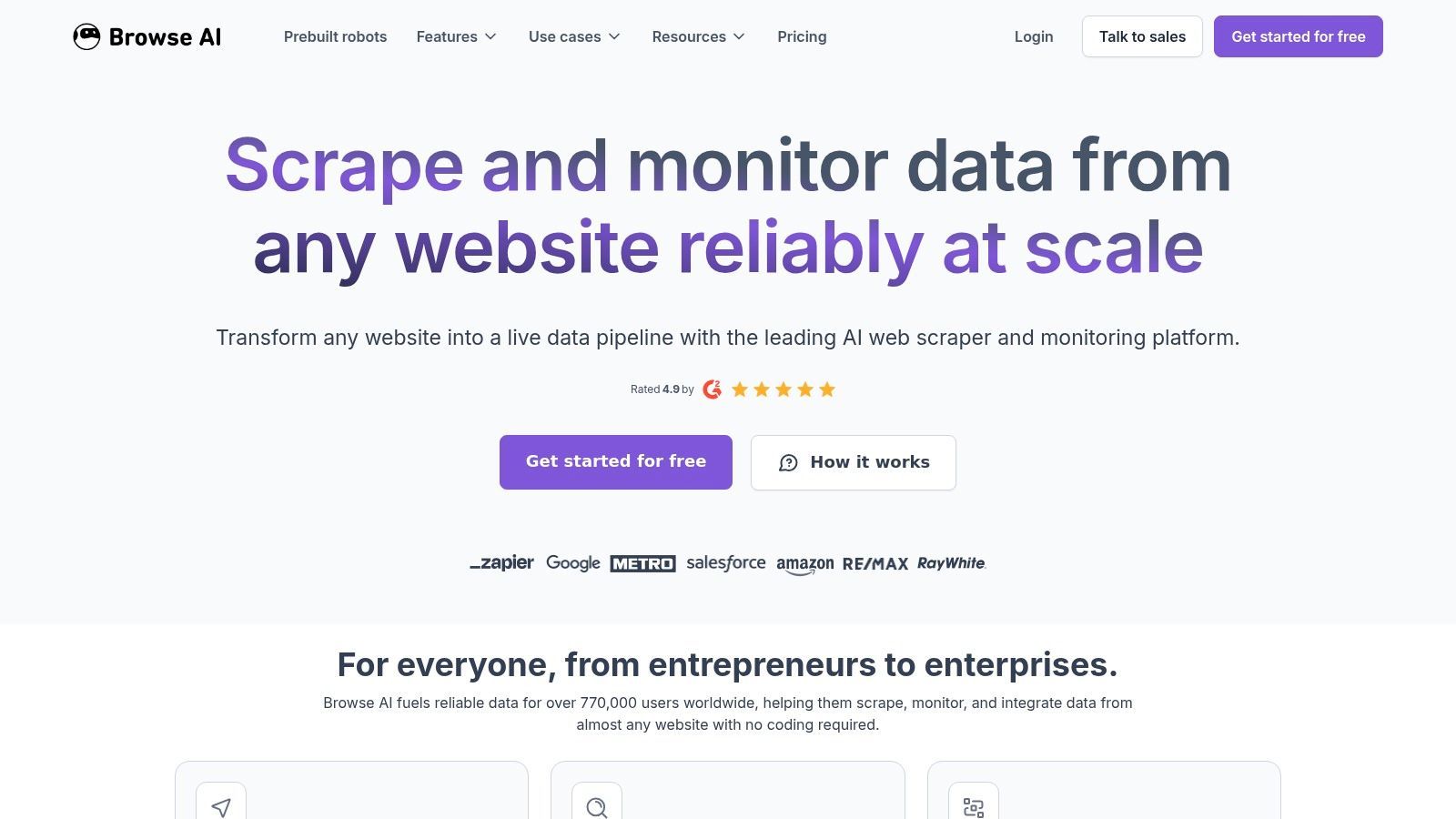
Unlike developer-centric tools, Browse AI excels at connecting scraped data to everyday business applications. It offers pre-built integrations with Google Sheets, Airtable, and workflow automation platforms like Zapier and Make. This allows users to set up automated pipelines where website changes or new data points trigger actions in their CRMs or project management tools. For businesses needing reliable, scheduled data monitoring with minimal technical overhead, Browse AI is one of the best AI scrapers available in 2025. Its SOC 2 Type II compliance also provides a layer of data security and control that is critical for business operations.
Key Features and Pricing
Browse AI operates on a credit-based system, where credits are used for tasks like running a robot or performing a check. Plans are tiered based on the number of credits and features like monitoring frequency, which can be as frequent as every five minutes on higher tiers. The pricing structure is accessible, with a free plan for small projects and paid plans starting around $49 per month for a substantial number of credits. They also offer managed onboarding to help teams configure complex robots for specific use cases.
- Pros: Very approachable for non-developers, fast and easy integrations to spreadsheets and CRMs, managed onboarding available for complex use cases.
- Cons: The credits model requires advance planning for frequent monitoring, and advanced anti-bot targets may still need tuning or proxies.
Website: https://www.browse.ai
Top 12 AI Scrapers Feature & Pricing Overview
| Product | Core Features/Characteristics | User Experience & Quality ★ | Value Proposition 💰 | Target Audience 👥 | Unique Selling Points ✨ | Price Points 💰 |
|---|---|---|---|---|---|---|
| 🏆 ProfileSpider | One-click profile scraper; no-code; universal compatibility; 100% local data storage; multi-format export | ★★★★★ Intuitive, one-click workflow | Privacy-first; flexible credit system; free tier | Recruiters, sales, marketers, researchers | Universal site coverage; local storage; accuracy | Free to Power plans; pay-per-profile credits |
| Bright Data | Enterprise scraper API; vertical templates; managed scraper service | ★★★★☆ Enterprise-grade, SLA & audit logs | Transparent per-record pricing | Large enterprises needing compliance | Large proxy pool; prebuilt vertical scrapers | Pay-per-1K-record pricing |
| Zyte | Scrapy-based API; rendering; scalable Scrapy Cloud hosting | ★★★★☆ Fine-grained pricing; developer tools | Pay-as-you-go + subscriptions | Developers, enterprises needing unblocking | Integrated rendering and extraction APIs | Per-1K request tiers |
| Apify | Ready/custom scraper bots ("Actors"); app store; compute pricing | ★★★★☆ Good docs, generous free tier | Credits + compute pricing | Hobbyists to enterprises | Prebuilt Actors; scalable automation | Credits and compute-based plans |
| Oxylabs | AI extraction; geo-targeting; JS rendering; CAPTCHA bypass | ★★★★☆ Reliable support, detailed docs | Success-based billing; flexible plans | Enterprises with high-volume, complex needs | CAPTCHA bypass; premium proxies | Pay-per-1K-results pricing |
| Decodo | AI parsing API; 100+ templates; large proxy pool | ★★★★☆ Competitive for mid-high volume | Flexible bundles; trials & money-back | Mid-to-high volume users | Large IP pool; comprehensive templates | Request volume based plans |
| ScraperAPI | Proxy handling; retries; rendering optional | ★★★★☆ Fast integration; transparent credit use | Good value for small/mid users | Developers needing quick API | Credit transparency; concurrency caps | Plan credits with add-ons |
| Octoparse | No-code desktop/cloud scraper; AI add-ons; managed services | ★★★☆☆ Accessible for non-devs; team support | Pay-per-result templates | Non-developers; startups; universities | No-code point-and-click; AI CAPTCHA solver | Free to paid tiers |
| Diffbot | ML-driven auto-extraction; commercial Knowledge Graph | ★★★★☆ Reduces manual tuning | Credit-based with enrichment-focused value | Users needing entity resolution and enrichment | Auto-extraction without selectors; knowledge graph | Credit-based pricing |
| Webz.io | Data-as-a-Service; historical & live feeds | ★★★★☆ Turnkey clean data; consulting available | Quote-based pricing | Data consumers needing archives | Extensive archives; multilingual coverage | Quote-based pricing |
| SerpApi | SERP scraping API; legal protections; SLA | ★★★★☆ Mature, stable parsing | Clear monthly & enterprise plans | SEO, AI/RAG data collectors | Legal shield; multi-engine support | Success-only billing |
| Browse AI | No-code AI scraping; visual recorder; scheduling & monitoring | ★★★☆☆ Easy for non-devs; integrations | Credit model for frequent monitoring | Non-technical users, business automation | Visual AI recorder; short interval monitoring | Credit packages |
Making Your Choice: Which AI Scraper is Right for You?
Navigating the landscape of AI-powered data extraction can feel overwhelming. After reviewing a dozen of the best AI scrapers for 2025, it's clear that the "best" tool is not a one-size-fits-all solution. Your ideal choice hinges entirely on your technical skill set, your specific use case, and your business goals. The market is broadly divided between powerful, developer-centric platforms and user-friendly, no-code solutions designed for professionals.
The journey to automated data collection requires you to answer a few critical questions about your needs. Are you a developer building a complex application that needs raw data APIs? Or are you a recruiter, sales professional, or marketer who just needs to get accurate profile data into a list, fast? Your answer will point you toward very different tools.
For Developers and Data Teams: The Power of Infrastructure
If your team lives and breathes APIs, requires immense scale, and needs to integrate data pipelines directly into proprietary software, then infrastructure-focused platforms are your best bet.
- Top Choices: Tools like Bright Data, Oxylabs, and Zyte are the titans in this space. They offer robust proxy networks, enterprise-grade APIs, and the raw power needed to handle massive, complex scraping operations.
- Key Considerations: These platforms require coding and are built for technical users. You will need development resources to implement and manage them effectively. They are powerful but are overkill for simple profile extraction.
For Niche Use Cases: Specialized and Pre-Built Solutions
Some tools have carved out a niche by focusing on very specific data types. If your needs are hyper-focused, a specialized scraper can save you significant time and resources compared to building a custom solution.
- Top Choices: SerpApi is the undisputed leader for extracting structured data from search engine results pages. For automated, AI-driven data structuring from any webpage, Diffbot offers a unique "Knowledge Graph" approach.
- Key Considerations: While powerful, these tools can be less flexible outside of their intended use case. Ensure your project aligns perfectly with their specialty before committing.
For Business Professionals: The No-Code Revolution
For the vast majority of recruiters, sales teams, marketers, and researchers, the goal is not to manage code but to acquire actionable data with minimal friction. This is where the no-code, one-click approach fundamentally changes the game, making it the modern alternative to traditional, complex scraping.
- Top Choice: ProfileSpider stands out as the ideal solution for this user base. It was built from the ground up to solve the exact challenges business professionals face: needing to extract complete, accurate profile information from any website without writing a single line of code.
- Why It Wins for Business Users:
- One-Click Simplicity: Its one-click extraction workflow saves hours of manual work and eliminates the technical barriers of other tools.
- Privacy & Control: By storing all data locally in your browser, it gives you complete control and ensures GDPR compliance, a critical factor when handling professional data.
- Universal Compatibility: Unlike specialized tools, it works on LinkedIn, GitHub, corporate websites, and virtually any other source, making it a truly versatile asset.
Final Thoughts: Aligning Your Tool with Your Goal
As we head into 2025, the trend is clear: AI is making data extraction more accessible than ever. While developer-focused tools will always have their place for large-scale, custom projects, the real growth and opportunity lie in empowering non-technical users to harness the power of web data.
Before you make your final decision, take a moment to evaluate your true needs. Do you need a complex toolkit, or do you need a direct solution? For business professionals looking to build candidate pipelines, generate lead lists, or conduct market research without technical overhead, the choice becomes simple. A tool like ProfileSpider provides the most direct, secure, and efficient path from a webpage to a valuable, organized list of contacts. Choose the scraper that empowers you to focus on your core job, not on becoming a data engineer.
